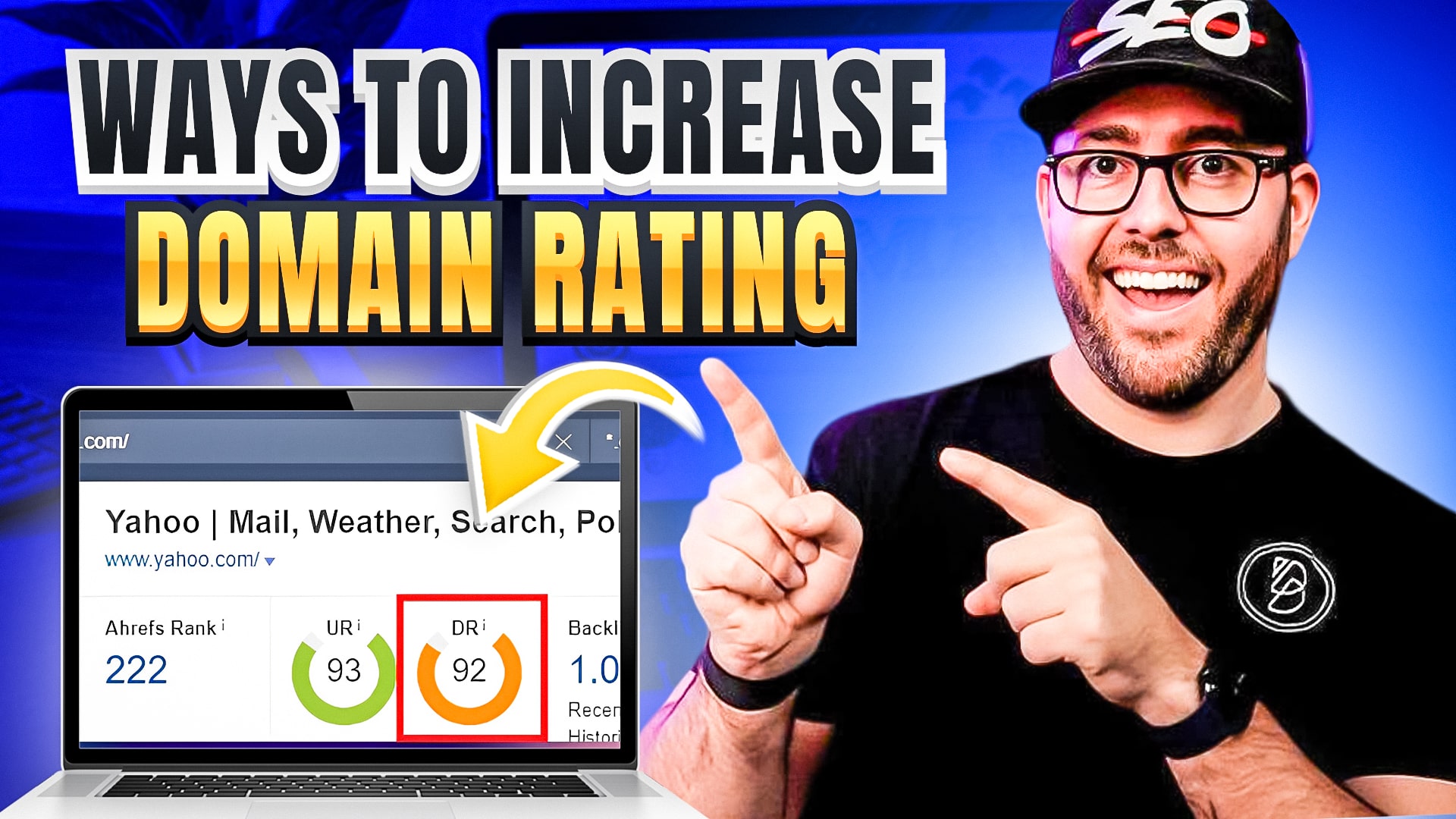
Do you want to take your website to the next level, rank higher on Google, and drive more organic traffic to your site? Then you’ll need to increase your website authority.
The right way to do this is to focus on high-quality backlinks from authoritative websites. In this guide, we’ll tell you how!
What Is Website Authority? (Domain Rating)
When using an SEO tool provider, you’ll see “website authority” as a metric. While it appears in every SEO tool, it’s sometimes called “domain rating” and calculated differently.
Website authority refers to the relative strength of a site’s backlink profile compared to every other site in its index. It usually runs on a logarithmic scale from 0-100, which means it’s more difficult to move from DR 85 to DR 86 than it is to move from DR 5 to DR 6.
According to the logarithmic scale, a DR 30 site is more than twice as ‘authoritative’ as a DR 15 site.
How Is Domain Rating Calculated?
Your website authority or domain rating is impacted by three things:
- The number of websites linking to you
- The DR score of linking domains
- The number of sites each referring domain links to
1. The Number of Websites Linking to You
Some SEO tools use a metric called “referring domains,” which is the number of websites that link to a page or website.
While it’s easy to think that the higher this number, the better your domain rating, it’s a bit more complex than that. DR calculations only use ‘followed links’, not sponsored, nofollow, or UGC links.
Also, keep in mind that links from the same website won’t improve a site’s DR since backlinks don’t count, only referring domains.
2. The DR Score of Linking Domains
You could get countless links from low-quality sites, but that won’t help increase your website authority. That’s because the DR score of the linking site is also taken into account when calculating Domain Rating.
Essentially, this means that your Domain Rating will increase when you have backlinks from websites with high DR scores.
It’s important to note that whenever the DR of a linking website increases, it will positively affect your DR. So even if you build a link from a DR10 website, the owner of that site might put time and effort into building his own website authority, which will benefit you in the long term. When their link increases to a, say DR 40, it will help to increase your DR as well.
Bottom line: it’s smart to build links from sites that have the potential to grow, even with low initial DR scores.
How to know if they have potential?
Look at their content. The more high-quality their content the more likely they will attract high-quality links over time.
Next, check your SEO tool’s Site Explorer. If the metric of the referring domain shows a steady upward slope, it’s a good sign.
3. The Number of Sites Each Referring Domain Links To
Let’s look at an example: you build two “followed” links from two different websites with the same DR score. Now you want to know which one of them will increase your domain rating more over time.
Here’s what you need to do: look at the number of sites with at least one followed link they are each referring domain links to. The more unique websites it links to, the less “DR equity” it has.
Simply put, if it links to lots of other websites, it may not help increase your DR. So focus on high-quality, followed links from authoritative websites as they will be the key drivers for increasing your Domain Rating.
How to Increase Your Domain Rating
By now, you probably get the gist: to increase your Domain Rating you just need to build more ‘followed’ links to your site.
Remember, though, that if the site linking to you has a low DR score or links to lots of other websites, it may not actually help you increase your DR.
Also, keep in mind that building links to random websites won’t boost your ranking or drive more organic traffic to your site. Instead, stick to building links directly to the pages that you want to rank in Google.
In fact, doing that will be more effective for driving traffic and improving your ranking than just increasing your DR. The number of referring domains to a page is more important for increasing organic traffic than the DR of the ranking website.
However, building links to the page you want to rank on Google can be challenging. Here are the three main ways you can indirectly increase your website authority:
- Create content that people want to link to
- Pitch relevant and authoritative websites
- Use internal linking to improve the ‘authority’ of important pages
1. Create Content That People Want to Link To
To create something that is likely to attract backlinks, it should be:
- Non-commercial – Since non-commercial content isn’t centered around making money, it’s more likely to be linked to. This also explains why it’s hard to get links to affiliate reviews or sales pages.
- Helpful – Something is helpful if it has utility. Examples are blog posts, calculators, or free tools. Content can also be helpful if it’s citable, such as studies, stats, or unique ideas that will attract attention from journalists and bloggers who then use your content to make a point.
Use an SEO tool to determine whether a topic you want to write about is link-worthy. Simply look at the number of referring domains to top-ranking pages on that topic. Don’t write about topics that are no longer relevant – you’ll just be wasting your time.
- History of getting links – First, install an SEO tool. Then, go to Google and research the topic of your content idea. Next, look at how many referring domains the top-ranking pages have. The higher the number of high-quality links, the more likely your topic is link-worthy. That’s because pages covering your topic show a history of attracting links.
2. Pitch Authoritative and Relevant Websites
Before people can link to your content, they need to know that it exists. That’s why you have to reach out to people and promote it.
To expand your reach, ask the following people to share your content:
- People who are featured in your article
- People who have written articles about similar topics
- People who have linked to articles on similar topics
3. Use Internal Linking to Improve the ‘Authority’ of Important Pages
Increasing your website authority can take time but by following the steps laid out in this guide, you’ll be able to improve SEO, rank higher, and grow your following.
Lastly, try using the “Middleman Method,” an SEO strategy that helps you direct some of the authority to the pages that you want to rank.
Domain Rating FAQs
Still have some questions about website authority/domain rating? Here are some commonly asked questions with answers!
What is a good domain rating score?
While this number varies depending on the industry and competition, a score of 40 or higher is generally considered good. A score of 70 or higher is considered excellent.
How often are domain ratings updated?
The frequency of updates varies depending on the tool or service you use to check your domain rating. While tools update the DR daily or weekly, others update less frequently.
Does having a high domain rating guarantee a high search engine ranking?
Unfortunately, having a high domain rating does not guarantee a high search engine ranking. Google determines rankings by more than just your DR and also uses factors like relevance, quality, and authority of a website, as well as the relevance of the search query.
Can a new website have a high domain rating?
Although it’s possible for a new website to have a high domain rating, it’s very unlikely. Typically, a new website starts with a low rating until it has had time to build backlinks and establish a reputation.
Can a website’s domain rating decrease?
It’s possible for a website’s domain rating to decrease if the site loses backlinks and traffic or experiences less engagement with the website.
Final Thoughts
If you want to expand your reach and grow your website, you’ll need to consistently work on increasing your DR. This will help improve your SEO and drive more traffic to your site.
However, don’t fixate on improving your website authority as the end goal. Instead, build high-quality links from relevant and authoritative websites to the pages you want to rank.
Although links aren’t the only thing that Google takes into account when determining search engine rankings, it’s a good start to boosting your DR and slowly improving your ranking over time.
